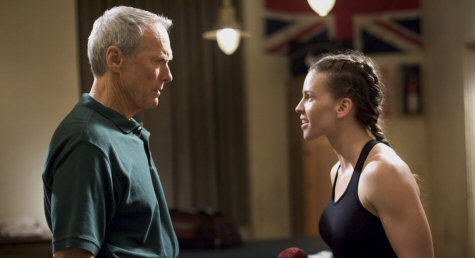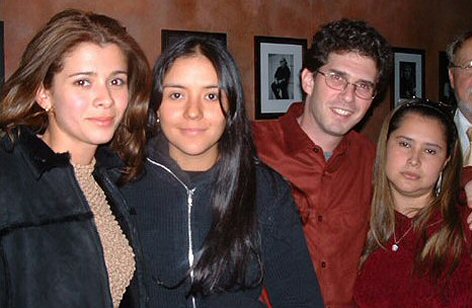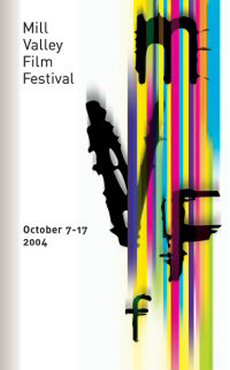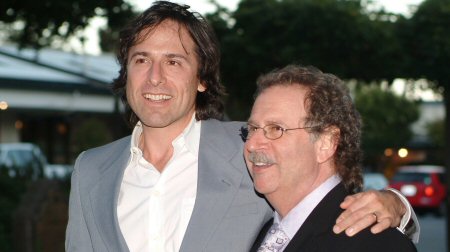Maybe Baby
Take this with a very small grain, but remarks from a couple of actresses have upped my interest in Clint Eastwood’s Million Dollar Baby (Warner Bros., 12.15).
Paul Haggis’s script is a surrogate father-surrogate daughter relationship piece. It’s about an aged ex-prize fighter (Eastwood) who decides to train a young woman (Hilary Swank) who’s determined to box. Morgan Freeman plays Eastwood’s longtime pal and confidante…the character with the pithy sayings and sage ringside commentary.
Haggis’s script is said to be based upon two short stories from the novel “Rope Burns,” by F.X. Toole. The plot has always sounded to me like a riff on Karyn Kusama’s Girlfight, with maybe a tad less emphasis on the girl boxer and a bit more on her trainer.
< ?php include ('/home/hollyw9/public_html/wired'); ?>

Clint Eastwood, Hilary Swank in Million Dollar Baby
Laura Linney, whom I interviewed last Monday regarding her just-opened film P.S. (Newmarket, 10.15) and who played a blue-collar Lady Macbeth in Eastwood’s Mystic River, has told me Million Dollar Baby is “really good.”
Linney said this with a certain conviction. Not in some deadly earnest, you-must-believe-me way, but in a tone of voice that said, “Well, yeah…of course…what else would you expect?”
An agent friend who sat down with Hilary Swank the other day says Swank is starting to think Eastwood might snag a Best Actor nomination for his portrayal of the haggard ex-boxer. Her remark wasn’t intended for journalistic absorption, so maybe she meant it.
This is all just talk, of course, but hearing these comments in the same week made me go, “Hmmm…maybe.”
You know going in that an Eastwood film will have a planted focused quality… that down-to-it, no-funny-stuff sensibility he brings to all his films. Maybe this will have a bit more.
The 12.15 Million Dollar Baby opening will be platformed — New York, L.A., Chicago, Toronto. It’ll break wide in January `05.
Ethnic Impurities
Easily, without question, Maria Full of Grace (Fine Line) is one of the best films released this year, one of the finest foreign-language movies I’ve ever seen, and a great woman’s film bar none.
Maria is one of those deserving indie flicks — quiet, character-driven, no stars, Spanish-speaking — that needs all the help it can get. A few Oscar noms in January would help.
The story’s about a poor, independent-minded 17-year-old girl from rural Colombia (Catalina Sandino Moreno) who accepts a gig as a drug mule in order to escape a dead-end life. Being a mule involves swallowing 60 or so sealed pellets of cocaine just before flying off to an American city (New York City, in this instance), and then crapping them out when she arrives. For this she gets $5000, minus expenses.
The film shifts into second gear when Maria embarks on her maiden voyage. On the same trip is Lucy (Giulied Lopez), an experienced mule whom Maria has befriended. Things get tense and then tenser, then somebody dies and tough calls have to be made.

(l. to r.) Maria costars Guilied Lopez, Catalina Sandino Moreno, director Joshua Marston, costar Yenny Paola Vega at Sundance Film Festival Fine Line party, January ’04
Joshua Marston, the film’s director-writer, wrote a totally solid script, and got superb performances out of each and every player, Moreno in particular. It seems especially remarkable that the U.S.-based Marston made Maria feel like an organic, hand-made Colombian right down to the bone.
His story is about Colombian characters, and wholly believable ones at that. 99% of it was acted in Spanish by a mostly Colombian cast, with slightly more than half of it filmed in Bogota, Colombia, and in Amaguacha, Ecuador. (A bit less than half was shot in Queens, New York, in the Colombian section of town, and on a set simulating a Manhattan-bound jet.) It’s a movie that looks brown, talks brown, thinks brown.
But it’s ineligible for a Best Foreign Language Film Oscar because the money and the behind-the-camera talent was too white.
This was essentially conveyed yesterday when the Academy of Motion Picture Arts and Sciences released their list of submitted foreign-language-feature entries.
Marston is a California Anglo (he went to the same high school as Angelina Jolie, Nic Cage, Lenny Kravitz, et.al.), a lot of the crew members were American, and four out of five companies that put up production cash were U.S.-based.
The Academy’s rejection of Maria Full of Grace as a Colombian film is “just technical,” says Fine Line marketing vp Marian Koltai-Levine. “It’s truly a technicality.”
The country of Colombia “supported it” and “wanted to submit it,” she adds.
Fine Line is unbowed, says Koltai-Levine. “We’re still running Academy campaigns on Catalina as Best Actress and Josh as Best Director, and Best Original Screenplay…we’re going for it.”
Foreigners
Which of the 49 films submitted for the Best Foreign Language Film Oscar have the most heat? I asked around yesterday, picked up some hints.
The two films most likely to be nominated are Alejandro Amenabar’s The Sea Inside (Fine Line), a Spanish-produced right-to-die drama with an Oscar-calibre lead performance by Javier Bardem, and Yimou Zhang’s House of Flying Daggers (Sony Pictures Classics), a visually operatic actioner from the Chinese director of Hero.
After these two it gets dicey.
Jan Hrebejk’s Up and Down, submitted by the Czech Republic, is said to be “a humanist cycle-of life” movie that “may play a bit too familiar…it’s good but has been done and seen before.”
Jorgen Leth and Lars von Trier’s The Five Obstructions, a Danish entry and a critical favorite at film festivals over the past year or so, is being dissed as too much of an elitist, smarty-pants exercise to draw any kind of groundswell support.

Bernd Eichinger’s Downfall, a German feature about the last days of Hitler (played by Bruno Ganz) in the Berlin bunker, is said to depict the Nazi leader in a way that may seem overly sympathetic (i.e., too vulnerably human) to industry mainstreamers, which, if true, means it’s toast.
The general Hollywood Jewish community rule is that Hitler can be portrayed only as a warhead of pure evil, straight from the molten caverns of hell. Downfall is based on the documentary Blind Spot: Hitler’s Secretary, based solely on the recollections of Traudl Junge, a Hitler assistant who was with him right to the end.
Nimrob Antal’s Kontroll, a Thinkfilm release from Hungary, ought to be one of the five. It’s a strong, stylistically nervy thing with a richly developed theme…except that Academy handicappers think it’s too strong and nervy, and they apparently feel the murky underground-subway milieu is a bit much. Go figure.
Brazil’s Olga, a true-life tale with a Holocaust undercurrent, is said to be shamelessly cornball, so it may have a chance. (HE’s Pablo Villaca wrote about this in his “Burden of Dreams” column two or three weeks ago — he said it was embarassing that the Brazilians bigwigs had submitted it.)
Timur Bekmambetov’sNight Watch, a big-budget submission from Russia, is kind of a Hollywood-style special effects fantasy thriller. A publicist tells me it’s set in present-day Moscow and is about “aliens who come down.” The IMDB says it’s about “forces that control daytime and nighttime doing battle.”
Night Watch has been a big hit in Russia, but will the Academy’s foreign branch want to salute a non-nativist Russian film trying to ape Big Hollywood? Fox Searchlight is releasing it sometime in ’05 — they couldn’t say when.
Blue Dog
I was finishing up the column this morning (10.22) and having a perfectly miserable time FTP-ing the photos when a Fed Ex guy came by with a package from Universal — a VHS of the new Meet the Fockers trailer. So I stopped working and popped it in.
Uh-huh, uhm-hmm, funny, funny, uh-huh…yeah, yeah, okay…whoa, FUNNY! A mix of toilet water and pet cruelty, and I was laughing for 15 or 20 seconds after the spot ended. I ran the tape three more times just to replay this one bit.
Except now it’s out there (I guess the trailer will be online before too long) and everyone will know about it going in, and so the movie won’t be quite as funny now.

That’s the trailer business for you — give away the money material in hopes that the audience will pay to see the film in order to get more. One hopes.
The invisible subtitle of this film is “Meet the Jews, Accept Them Into Your Family, and Sacrifice the Purity of Your Wonderbread Bloodline.”
The premise has been drilled into everyone’s head, but maybe someone’s been napping.
Having given their blessing to their daughter Pam’s (Teri Polo) wedding to neurotic male nurse Greg Focker (Ben Stiller), ex-CIA wacko Jack Byrnes (Robert De Niro) and wife Dina (Blythe Danner) travel to Detroit to meet the Greg’s touchy-feely liberal wacko parents, Bernie and Roz Focker (Dustin Hoffman, Barbra Streisand).
Meet the Fockers (Universal) opens on 12.22.
North, Part 2
Here I am finally writing about the entirely agreeable, smoothly run Mill Valley Film Festival, which I visited last weekend. It began on 10.7 and wrapped on 10.17…the usual ten days of screenings, q & a’s, parties, etc.
Mark Fishkin, the festival’s founder and executive director, picked up the phone last Sunday morning to suss things out a bit. The main subject was how Fishkin and his team managed to keep the festival going despite the collapse of the roof of one of the theatres inside the festival’s prime venue, Mill Valley’s Sequoia Theatre, in mid August.
The Sequoia’s owner, Century Cinemas, “was extremely optimistic that they could have it repaired before the festival began,” says Fishkin, “and the optimism was so great that there was no hint that it might not happen in time. As it was, we were told this about two hours before the press conference began.”
Century partly made up for this by providing two screens at the Century Northgate in northern San Rafael.


The rest of the festival schedule played at the first-rate San Rafael Film Center, which is owned and operated by the Film Institute of Northern California (also the parent org of the annual MVFF). The theatre is located on 4th Street in downtown San Rafael, and is know for its top-notch projection and sound quality. (I can attest to these personally.)
Switching everything around at the last-minute cost the festival an extra $20,000, says Fishkin.
I Heart Huckabees director David O. Russell showed up on opening night. Mike Leigh and likely Best Actress Oscar nominee Imelda Staunton dropped by to talk about Vera Drake. Alfred Maysles visited and gave a “master class” on documentary filmmaking. Laura Linney flew in for a day to talk about P.S.. Gena Rowlands stopped by, and so did Kinsey director Bill Condon.
Fishkin founded the MVFF in 1977. The festival has twelve regular staffers based in Mill Valley. The work force goes up to 27 or so in June, and then up to 100 during the festival run, along with the efforts of some 300 volunteers.

“It’s like making a movie every year, but you don’t end up with a negative,” Fishkin says.
Tom Luddy’s semi-secluded, non-competitive Telluride Film Festival was Fishkin’s inspiration when he started the MVFF in ’77. “Our atmosphere is still like that of a destination festival, but the numbers are more like an urban festival,” he says. The attendance this year was 40,000. The highest ever tally was 43,000.
Fishkin acknowledges the obvious fact that film festivals have exploded across the American landscape over the last decade. “First everyone wanted to write the Great American Novel, and then direct their own Hollywood movie,” he says. “Now everyone wants to manage their own film festival.”
Hell You Say
I nominate Tom Cruise to play the part of Lars Von Trier’s spiritually anguished American biologist in Antikrist,, which the provocative Danish helmer plans to shoot after finishing Manderlay, the second part of his Amerika trilogy.
In fact, I insist on this happening…even if Cruise can’t fit it into his schedule.
Peter Aalbek Jensen, von Trier’s producer, said earlier this week (I popped this into the WIRED column on Thursday morning) than the plan is to finish Antikrist in time to show it at the 2006 Cannes Film Festival.
This means Cruise probably can’t do it, since he’ll be making Steven Spielberg’s War of the Worlds and then Mission Impossible 3 through most of ’05. Because he’ll need to do something solemn and arty after these two, and a good von Trier would be just what the doctor ordered.

The Cruise idea is just a floater from Sweden, but von Trier is looking for a major American actor for the lead, and he went with Nicole Kidman for Dogville, so why wouldn’t he try for Cruise?
Jensen called Antikrist a “horror film.” Knowing von Trier, I’m guessing the horror will be more of a philosophical than a hair-raising thing.
Jensen told a Swedish reporter that Antikrist will “put an end to the big lie that God created the world,” and explore the more compelling view is that “it was Satan who created the human race and the world.”
There’s no script yet apparently, but according to a story in the Danish daily Berlingske Tidende , the plot will be about an American biologist who develops a fear of nature, finding it to be a place of evil, and starts seeking therapeutic help.
As Antikrist develops, von Trier’s theory of Satan being the true father and creator will be explored.
There’s a more detailed piece about this in the Swedish newspaper daily Dagens Nyheter .
Aristotle and Alexander
“Your question about whether Oliver Stone’s Alexander might capture “the bedrock faiths and realities of the time and culture in which he lived is a good one. But is Aristotle a significant player in the film? He should be. The `father of rational thinking’ certainly had a hand in creating the world conqueror, as he was Alexander’s personal tutor during his early teen years.
Aristotle believed in the City State idea, and this thinking was diametrically opposed to the philosophy Alexander later adopted. Aristotle believed that the Greek citizen was superior to others, and he held a condescending attitude towards other cultures, particularly Persians. Alexander came to embrace other cultures, albeit through conquest.
“When Alexander, in the name of cultural harmony, ordered several thousand of his Greek soldiers to take Persian wives, and to consummate their marriages by fornicating on the side of a hill, Aristotle must have come unglued. (I’ll bet that scene isn’t in the film).” — Ron Cossey, Studio City.
Distant Drum
“I’m not surprised that Charles Taylor hated Sideways I went to college with the guy (Connecticut College, class of ’83) and in those days he pretty much despised all contemporary filmmakers except Brian De Palma. (He put Dressed to Kill and blow out in the same category as The Godfather and Nashville.)
“I like Charlie and I think he’s a good writer, but calling Alexander Payne `a pretentious wiseass’ is like calling David O. Russell `formulaic.’ It makes him look stupid.” — C. Hashagen
Wells to Hashagen: DePalma acolytes are a weird bunch. They’re like born-again Christians. They’ve seen the light and you haven’t.












